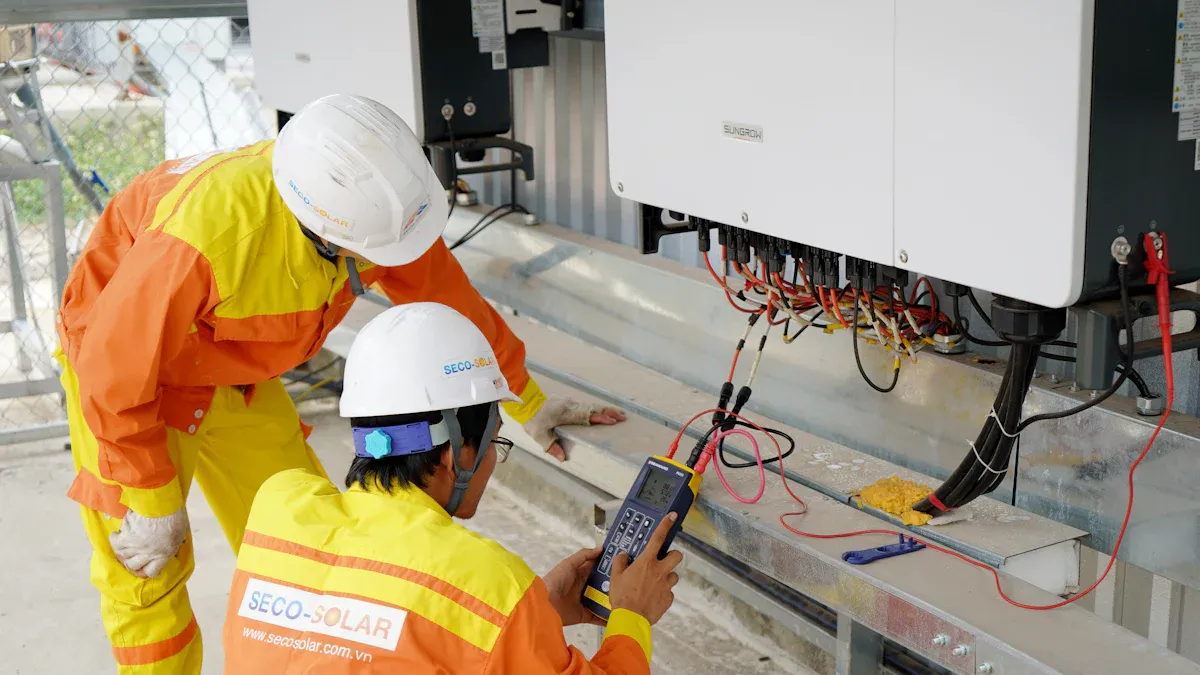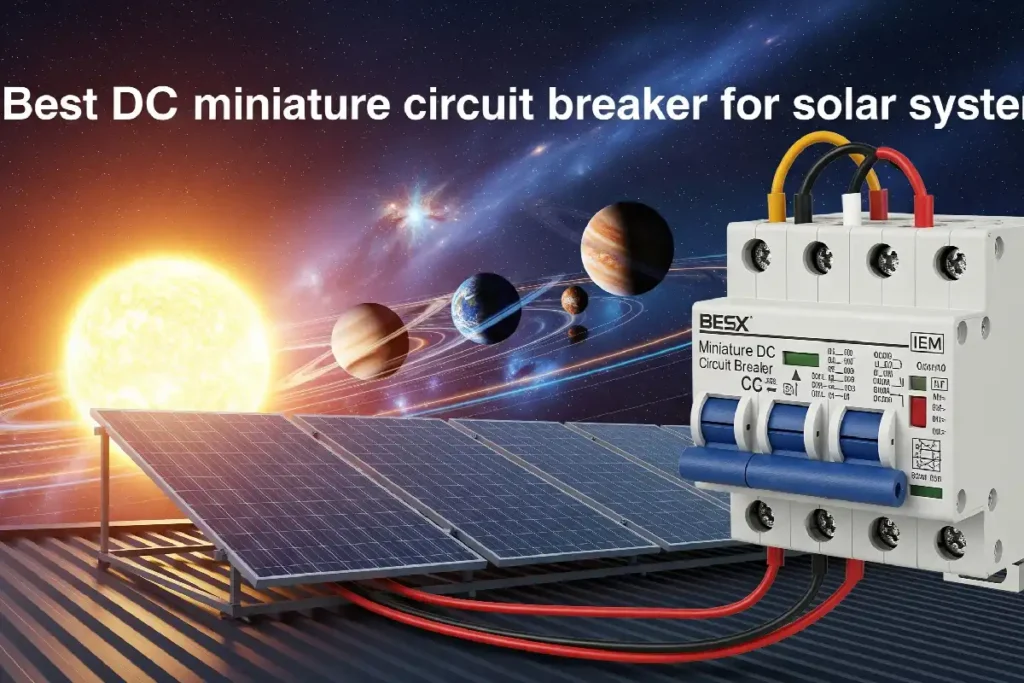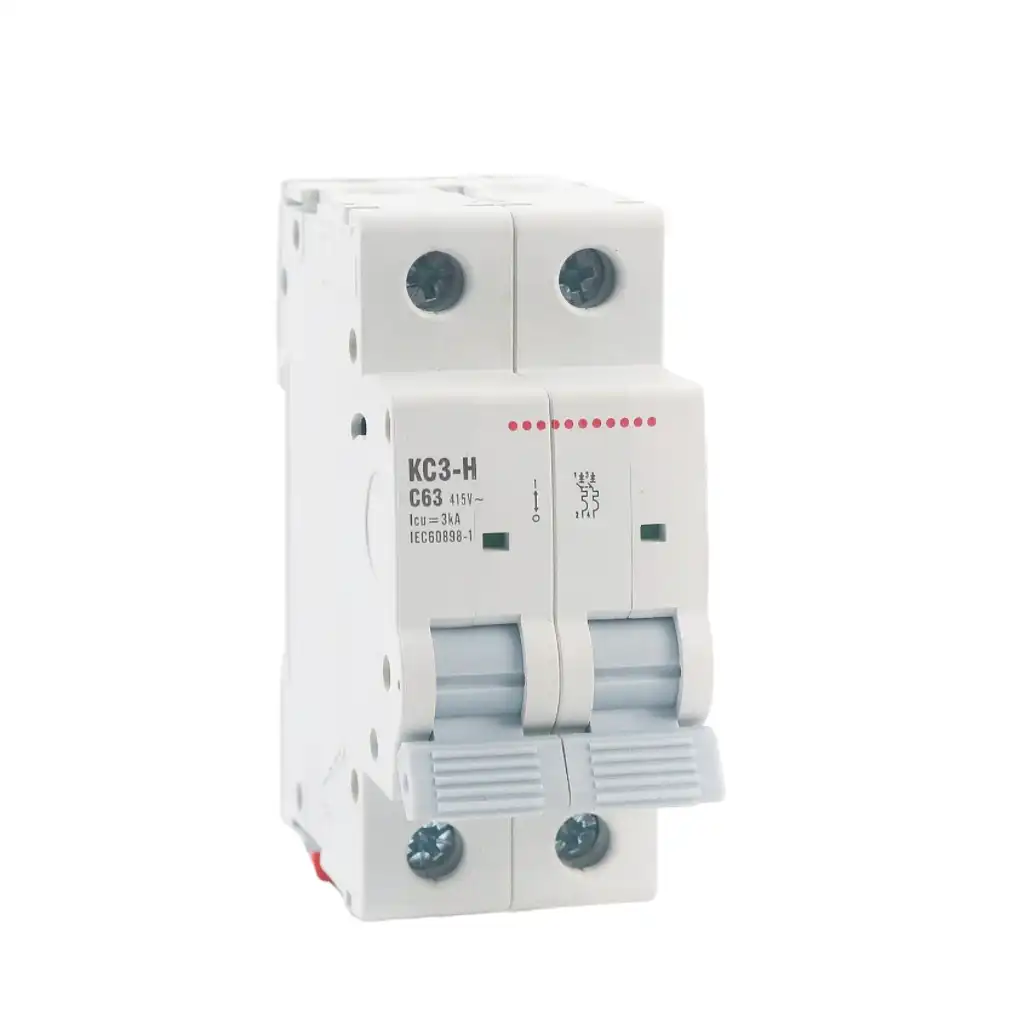You want the Best DC Miniature Circuit Breaker for your solar system. ONESTOP is a top company with good quality and strong safety. The company follows ISO9001:2015 rules and meets world standards like IEC and UL. ONESTOP has certifications like CE, CB, TUV, and KEMA-KEUR. These breakers are great for solar systems. More people need DC circuit breakers because solar projects are growing. Picking the right DC MCB keeps your system safe and protects your money.
Key Takeaways
- Pick a DC miniature circuit breaker that fits your solar system’s voltage and current. This helps keep your system safe and working well.
- ONESTOP breakers have strong safety features. They have world certifications. They offer flexible choices for many solar projects.
- Always choose breakers with certifications like IEC, CE, and UL. These make sure the breaker is good quality and lowers risks.
- Use the right steps to size, install, and take care of your breaker. This gives long-lasting protection and makes it easy to use.
- Test and check your breaker often. This helps stop problems and keeps your solar system working smoothly.
Top Pick
Best DC Miniature Circuit Breaker
If you want the Best DC Miniature Circuit Breaker for your solar system, ONESTOP is a great choice. Their product follows important world standards like IEC, CE, and UL. ONESTOP’s DC miniature circuit breakers have special features. These include arc fault detection, dual trip curves, and surge protection. These features help keep your solar system safe from too much power, short circuits, and voltage spikes.
You can rely on ONESTOP’s breakers for solar use. Each breaker is made to handle high DC voltages in solar power. The small size saves space in your panel. This makes it easy to install and use. ONESTOP’s breakers can reset by themselves and have trip settings you can change. This helps you use them for different solar projects.
Quick Overview
ONESTOP has more than 19 years of experience in making electrical products. The company uses smart machines to build and test every part. This makes sure each part is made very well. ONESTOP follows the ISO9001 quality system and tracks every product. You get products that are tested carefully before you buy them.
Customers like ONESTOP’s DC miniature circuit breakers because they last long and work well in solar systems. Many people talk about the helpful support and easy buying process. You will see that ONESTOP’s team is patient and knows a lot. This makes buying simple and worry-free. Most customers are happy and trust ONESTOP. Many want to buy again.
Tip: Pick ONESTOP if you want a breaker with strong safety, world certifications, and good performance for solar energy.
ONESTOP is known around the world for quality, new ideas, and caring about customers. When you choose ONESTOP, you get the Best DC Miniature Circuit Breaker for your solar project.
Why Pick This Breaker
Main Features
When you pick ONESTOP, you get more than a regular breaker. This product is made for safety, easy use, and flexibility. ONESTOP’s DC miniature circuit breakers have some special features:
- Customizable Options: You can choose the rated current and brand label. You can also change other settings for your solar project. This helps you get the right breaker for your needs.
- International Certifications: ONESTOP’s breakers meet IEC, CE, and UL standards. These certifications show the breakers pass tough safety and durability tests.
- Advanced Safety Features: Each breaker has arc fault detection and dual trip curves. They also have built-in surge protection. These features keep your system safe from overloads, short circuits, and voltage spikes.
- Easy Installation: The small size saves room in your panel. You can install the breaker fast, even in small spaces. The automatic reset and adjustable trip settings make it simple to use.
Note: ONESTOP’s breakers are tested for leakage current and insulation resistance. They are also tested for withstand voltage and grounding. These tests make sure the breaker works safely in all places, even outside in tough weather.
Solar System Benefits
Solar PV systems need special protection. ONESTOP’s breakers help in many ways:
- They can handle high DC voltages found in solar arrays. This keeps your equipment safe from electrical problems.
- The arc extinguishing design stops sparks that can cause fires or damage.
- Modular construction lets you add or swap breakers as your system grows.
- The strong build keeps out dust, moisture, and UV rays. This helps your breaker last longer outside.
When you use ONESTOP, you get the Best DC Miniature Circuit Breaker for your solar setup. The certifications and special features help your solar system work safely and well. This gives you peace of mind.
Selection Criteria
Voltage & Current Ratings
You must match the voltage and current ratings to your solar system. Solar PV systems use higher DC voltages than AC circuits. Most homes and businesses need breakers rated for 300V, 600V, 900V, or up to 1200V DC. The current ratings are usually between 1A and 63A. This depends on how big your system is and how much power it uses.
| Parameter | Range/Values | Notes |
|---|---|---|
| Rated Current (A) | 1A, 2A, 3A, 4A, 6A, 10A, 16A, 20A, 25A, 32A, 40A, 50A, 63A | These are common current ratings for DC MCBs in solar setups. |
| Rated Operating Voltage | DC300V, DC600V, DC900V, DC1200V (max) | These are typical voltage ratings for solar PV systems at home or work. |
| Pole Configurations | 1P, 2P, 3P, 4P | These support different system setups, from single-phase to three-phase. |
| Breaking Capacity | 6kA, 10kA | These are good for stopping fault currents in solar DC circuits. |
ONESTOP gives you many voltage and current choices. You can pick a breaker that fits your needs.
Breaking Capacity
Breaking capacity shows how much fault current the breaker can stop. Solar systems often need a breaking capacity from 2 kA to 10 kA. This depends on the voltage and pole setup. A higher breaking capacity means better protection from short circuits. ONESTOP’s DC MCBs meet or beat these standards. This helps you feel safe.
Certifications
Certifications show your breaker meets safety and quality rules. Look for marks like IEC, CE, UL 489, and UL 1077. These mean the breaker passed hard tests for solar use. ONESTOP’s breakers have all the big certifications. You know you are buying a safe and trusted product.
Tip: Always look for certifications before you buy a DC MCB for your solar project.
Durability
You want a breaker that will last a long time. ONESTOP checks every unit for electrical, mechanical, and insulation strength. Their breakers stand up to dust, moisture, and UV rays. With an 18-month warranty and good support, ONESTOP helps keep your solar system safe for years.
Compatibility
Your DC MCB should work well with other solar parts. Make sure the current rating, breaking capacity, and trip curve fit your system. ONESTOP’s modular design and custom features make it easy to add their breakers to any solar setup. Always check connection types and accessory fit for easy installation.
Note: Picking the right DC MCB keeps your solar system safe, works well, and is easy to take care of.
Product Comparison
Best DC Miniature Circuit Breaker Brands
When you search for the Best DC Miniature Circuit Breaker for your solar system, you will find many trusted brands. ONESTOP is a leader because it has strong certifications, great safety features, and many choices. Other big brands are ABB, MOREDAY, NOARK, LS, Suntree, Schneider Electric, Siemens, and Mitsubishi Electric. These companies have been in the electrical business for a long time. They offer many products for solar use.
Top brands care about safety, reliability, and following world rules. Many use good materials like silver alloy contacts and bodies that do not catch fire. Most brands make their breakers easy to install and fix. Some brands also have smart features. These let you check your breaker from far away and see data.
Comparison Table
| Brand | Certifications | Breaking Capacity | Voltage Range | Customization | Key Features |
|---|---|---|---|---|---|
| ONESTOP | IEC, CE, UL, TUV, CB | Up to 15kA | Up to 1500V | Yes | Arc suppression, surge, modular |
| ABB | IEC, UL, CE | Up to 10kA | Up to 1200V | Limited | Reliable, global support |
| MOREDAY | IEC, CE | Up to 6kA | Up to 1000V | Some | Cost-effective, compact |
| NOARK | IEC, CE, UL | Up to 10kA | Up to 1200V | Some | Durable, easy install |
| LS | IEC, CE | Up to 6kA | Up to 1000V | Limited | Simple, affordable |
| Suntree | IEC, CE, TUV | Up to 6kA | Up to 1000V | Some | UV resistant, modular |
| Schneider Electric | IEC, UL, CE | Up to 10kA | Up to 1200V | Limited | Smart tech, strong brand |
| Siemens | IEC, UL, CE | Up to 10kA | Up to 1200V | Limited | Reliable, global presence |
| Mitsubishi Electric | IEC, UL, CE | Up to 10kA | Up to 1200V | Limited | Quality, long lifespan |
Pros & Cons
- ONESTOP:
- Pros: Many certifications, high breaking capacity, strong safety, can be changed, worldwide help.
- Cons: Not as well-known as ABB or Schneider Electric.
- ABB, Siemens, Schneider Electric, Mitsubishi Electric:
- Pros: Famous brands, trusted products, big support teams.
- Cons: Fewer ways to change, cost more money.
- MOREDAY, NOARK, LS, Suntree:
- Pros: Cheaper, simple to put in, good for small jobs.
- Cons: Lower breaking capacity, not as many special features.
Tip: Pick ONESTOP if you want strong safety, many choices, and top certifications for your solar project.
Use Cases
- ONESTOP: Best for solar PV systems that need high voltage, extra protection, and custom options.
- ABB, Siemens, Schneider Electric, Mitsubishi Electric: Good for big business or factory solar projects where brand name and help are important.
- MOREDAY, NOARK, LS, Suntree: Good for small home solar systems or when you need to save money and only need basic safety.
You can see that the Best DC Miniature Circuit Breaker for your solar system depends on what you need. ONESTOP is special because it has advanced features and many choices, so it is a top pick for lots of solar uses.
How to Choose
Step-by-Step Guide
Picking the right DC miniature circuit breaker for your solar system takes careful steps. You want to keep your system safe and protect your money. Follow these steps to help you choose:
- Calculate Your Load Current
Add up the current from every device in your solar system. This tells you the lowest rating your breaker should have. - Determine Breaker Size
Take the inverter’s biggest output current and multiply by 1.25. This makes sure the breaker can handle extra power. Pick the next highest standard breaker size. - Match Voltage Rating
Find out your system’s highest DC voltage. Choose a breaker with a rating at or above this number. Common choices are 600V, 1000V, or 1500V DC. Sometimes, you need to connect poles together for higher voltages. - Select Breaking Capacity
Make sure the breaker can stop the largest fault current in your system. This helps prevent damage and fire. - Choose the Right Type
Pick an MCB type (B, C, or D) that fits your load. For solar PV, type C or D is usually best. - Consider Environmental Conditions
Look at where you will put the breaker. Pick one with the right IP rating for dust, water, and heat. - Check Certifications
Always pick breakers with certifications like IEC 60947-2, UL 508, or UL 1741. These breakers have passed tough safety tests.
Tip: Always follow what the manufacturer says for sizing and installation. Use MCBs made for DC to make sure your system works well.
Common Mistakes
Many people make mistakes when picking DC miniature circuit breakers for solar systems. You can avoid these problems by learning what to watch for:
- Not matching the breaker’s voltage rating to your system can hurt parts and make them wear out faster.
- Forgetting about temperature can make breakers trip early or stop working. Always pick breakers that work well in high heat.
- Picking the wrong size can cause too many trips or not enough protection. Small breakers trip too much. Big breakers may not keep your system safe.
- Not checking for certifications and standards can make your system less safe. Certified breakers lower risks by up to 40%.
- Ignoring things like humidity and heat can make breakers not last as long or work poorly.
- Not following the manufacturer’s rules can make your system unsafe or not work right.
Note: The right size and certified breakers keep your solar system safe and working well. Always check the specs and instructions before you buy.
Installation & Safety

Installation Tips
You want your solar system to be safe and work well. Installing your DC miniature circuit breaker the right way is very important. Always do these steps:
- Get help from a trained electrician if you are not sure.
- Put on safety goggles and gloves that protect you.
- Read the instructions from the manufacturer before you start.
- Check the breaker for damage before installing it.
- Pick a breaker that fits your system’s voltage and current.
- Do not use the breaker for more power than it allows.
- Place the breaker near the power source, before any loads.
- Make sure all wires are tight and secure.
- Ground the system to lower the risk of electric shock.
- Leave space around the breaker so you can reach it.
- Label breakers and panels with voltage and warning signs.
- Add switches that let you turn off power quickly in emergencies.
- Use wires and connectors made for solar and outdoor use, like copper wires and MC4 connectors.
- Follow local electrical codes and rules.
Tip: Check your breaker and panel often for loose wires or damage. Do not change the protection settings from the manufacturer.
Maintenance
Taking care of your DC miniature circuit breaker helps your solar system last longer. Do these steps to keep it working well:
- Look at the breaker often for wear or damage.
- Test the breaker to see if it trips when it should.
- Clean the contacts to get rid of dust and dirt.
- Follow the maintenance schedule from the manufacturer.
- Change the breaker if it does not work right.
Note: Clean the breaker panel and test the breaker with the test button. Make sure all load wires go through the breaker so it works right.
A DC miniature circuit breaker that is installed and cared for protects your solar system and keeps your money safe.
You want the Best DC Miniature Circuit Breaker for your solar system. ONESTOP is special because it has many years of solar experience. The breakers use strong materials and can be changed to fit your needs. You get help any time and an 18-month warranty. If you follow the steps for picking and comparing products, you will make safer choices. Always put in breakers the right way and ask experts for help. This keeps your solar panels safe and helps your system work well.
FAQ
What makes a DC miniature circuit breaker different from an AC breaker?
A DC miniature circuit breaker handles direct current. You need it for solar systems because DC power acts differently than AC. DC breakers stop faults faster and prevent arc damage in solar setups.
How do you choose the right DC MCB size for your solar system?
You should check your system’s voltage and current. Pick a breaker with ratings that match or exceed your solar setup. Always follow the manufacturer’s sizing guide for safety.
Can you use ONESTOP DC MCBs outdoors?
Yes, you can use ONESTOP DC MCBs outside. The strong build resists dust, moisture, and UV rays. You get reliable protection for outdoor solar installations.
How often should you test or replace your DC MCB?
You should test your DC MCB every six months. Replace it if you see damage or if it does not trip during a test. Regular checks keep your solar system safe.
Do ONESTOP DC MCBs work with all solar panel brands?
ONESTOP DC MCBs fit most solar panel systems. You need to match the voltage, current, and connection type. Check your panel specs before installing the breaker.
See also
How to avoid common mistakes with AC and DC miniature circuit breakers
Can I use AC miniature circuit breakers for solar panels?
How to Choose a Solar DC MCB for Maximum Protection
How to Install a Three-Phase Surge Protection Device Step by Step
Understanding DC Miniature Circuit Breakers for Beginners





